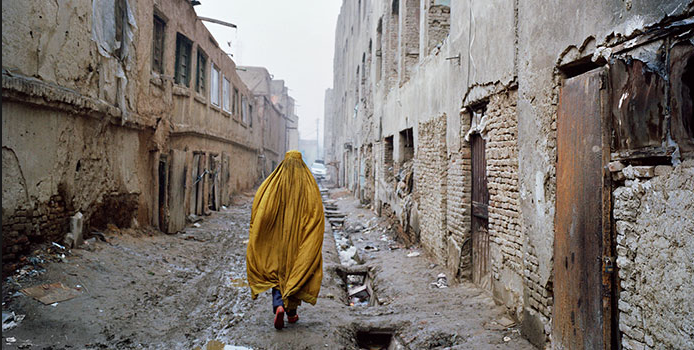
It’s a troubling film with an astonishing
central performance by Iranian actress Golshifteh Farahani (last seen in the
tense and powerful About Elly) that
is both subtle and attention-grabbing. Her husband has been injured in the war
and now lies at home in a persistent vegetative state. The film charts the
terrible dilemmas facing the (unnamed) woman and her traumatic past at the hands
of this abusive man and his family, as she recounts her life in a serious of
monologues. If that sounds a little stagey - it is: for much of the film there
are two people in a room and one of them can’t speak! Yet it works remarkably
well. The explicit, shocking and poetic script just about manages to avoid too
many “but how can I be telling you this” moments though, as with so many films,
it suffers by repeatedly and explicitly expressing its themes. Rahimi’s
creative, but not fussy or tricksy, camerawork helps however as does his use of
close ups and extreme close ups on Farahani’s face, producing real and
affecting intimacy.
So, a very good film then but I think it’s
my white liberal guilt that has me troubled. First, the male characters, those
in the film and ones we are told about, are all irredeemably bad, bar one – and
he starts out as a rapist. This is made even more complicated by the fact that
the director, co-writer and much of the crew are male. Secondly all these men
are Muslims and the film unblinkingly exposes the hypocrisy, violence and
misogyny at the heart of this village’s life - though the film is very good at
showing the brutality of the war and how it affects every aspect of life. Thus
the film raises those age-old questions about representation and how sensitive
artists have to be to broader political questions – in this case the
anti-Muslim feeling and propaganda in the West. It doesn't try to be fair or tell the whole picture - but does it have to? Sometimes a cry of rage is required! 

For these reasons the film did make me feel
uncomfortable. That said, Rahimi's film gets to grips with truths, questions and
dilemmas in a way that is artistically and politically interesting and has a fierce moral complexity too. I'm inclined to think most of my discomfort is of the kind the text wants to incite. The film for instance
questions whether and how the woman and her aunt might to some degree be
empowered by prostitution – such are their dearth of choices and the fragility
and precariousness of their existence. It could have also been unremittingly
bleak but moments of humour and the smiles and complex emotions on Farahani’s
face skilfully punctuate the darkness. The line “men should learn to fuck with
their mouth and talk with their dick” got a big laugh and murmurs of agreement
from the women in the audience.
The
glory of The Patience Stone is the
central performance by Farahani – another great role in what was a great
year for women’s roles. Though it has weaknesses it’s also one of those films
you want to discuss and you can’t help but respond to its mixture of rage, despair
and quiet confidence. The DVD is out at the start of March – I can’t wait to talk about it with others.
No comments:
Post a Comment